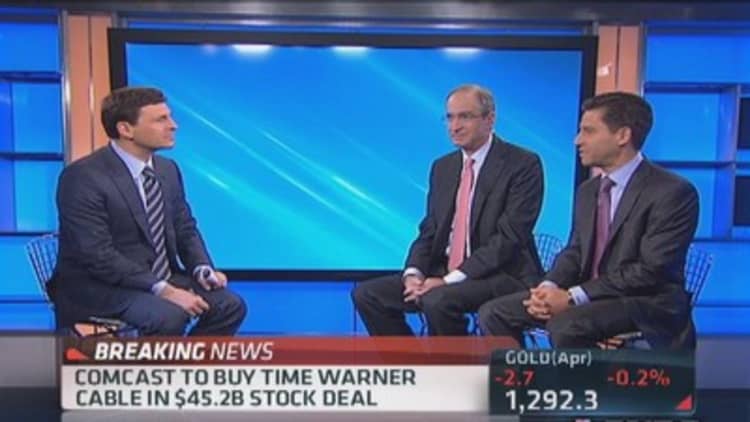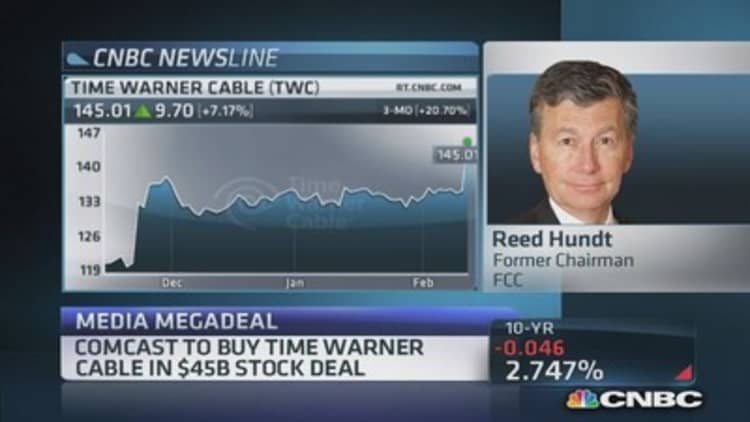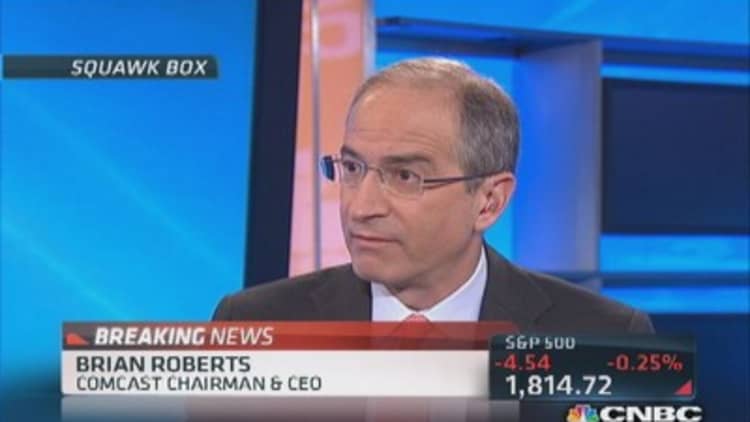
Comcast's planned acquisition of Time Warner Cable may be good news for sports fans, but maybe not so much for budget-conscious subscribers.
Comcast said Thursday that it plans to buy Time Warner Cable in an all-stock transaction for $45.2 billion, outbidding Charter Communications. (Comcast is the owner of NBCUniversal, the parent company of CNBC.)
The deal is expected to face scrutiny from regulators, but if approved would create the largest cable provider in the country, with more than 33 million subscribers.
(Read more: Comcast CEO; Time Warner Cable deal 'pro competitive')
Analysts say it's that customer block that creates some of the sharpest benefits—and downsides—for subscribers.
"Comcast has more leverage, because they're larger," said Mukul Krishna, Frost & Sullivan's digital media senior global director.
Customers would be much less likely to see service disruptions, such as Time Warner Cable's month-long CBS blackout in August 2013, over contracts detailing how much the cable company paid to carry network content. Football fans had campaigned aggressively for an end to the blackout ahead of the start to the NFL season.

"That dispute with CBS last year, it really hurt Time Warner Cable," said Erik Brannon, a senior analyst with IHS Global Insight. The cable operator lost more than 300,000 subscribers during the third quarter, in part due to the blackout. "Nobody is going to go black on Comcast, period," he said. "It's a pretty powerful block."
Comcast and Time Warner did not immediately return calls seeking comment for this story.
But Comcast's extra leverage could also elevate prices somewhat. Nationwide, the television portion of consumers' telecom bill averaged $47.38 in January, or 23 cents less than in December, according to utility comparison site WhiteFence.com, a division of AllConnect.
The Internet portion was $39.06 in January, up from $36.17 a month earlier, while phone costs averaged $13.05, down from $14.21.
For some subscribers, any changes will be a moot point. Comcast has said it will divest itself of 3 million customers to ease competition concerns, although it has not yet said where or how that will take place.
(Read more: Who are the biggest losers in the Comcast merger?)
Both Comcast and Time Warner Cable tend to have rates on the higher end of the spectrum, Brannon said. "Frankly I would be kind of nervous about my rates going up," he said.
Krishna said the cable operator would be unlikely to institute a major hike, which could prompt more subscribers to cut the cord or try out a lower-priced telecom competitor like AT&T or Verizon. "Churn is the biggest challenge for them, and right now, consumers have so many options," he said. "Competition is going to be very healthy."

Subscribers are also likely to see some services improve. Comcast has invested more in high-tech services and infrastructure than Time Warner Cable has, Krishna said.
Comcast's new X1 and X2 cable boxes are cloud-based and allow voice commands; a deal with Microsoft lets Xbox 360 owners use its Xfinity TV app on the console in lieu of a set-top box.
Plus, the Xfinity TV Go app allows for live-TV watching on a tablet or smartphone. "They lead in the TV everywhere experience," Brannon said.
(Read more: Comcast deal 'too big to sail' past feds)
Of course, that technology could result in its own kind of bill-padding. "Comcast is buying a solid subscriber base and is trying to sell value-added services," Krishna said.
For example, Comcast's Xfinity has a line of home security systems and smart home products that work in with its network, with starting prices of $40 per month. Adding such services doesn't just increase your bill; it makes it harder to break away, he said.
—By CNBC's Kelli B. Grant. Follow her on Twitter @Kelligrant and on Google.


